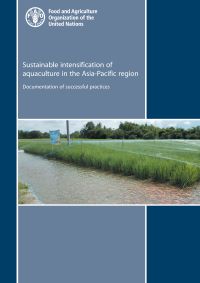Sustainable ethical aquaculture trade
4 March 2013 | David Little | 4485 views | .mp4 | 36.32 MB | Environment and Sustainability
Over the past decade aquaculture has seen its focus transform rapidly from domestic demand to global trade. Initially driven by the shrimp trade, the pattern is repeating for white fish species such as pangasius and tilapia. As the scale of the transformation impacts on production systems and markets in developing countries all around the world, it is therefore important to understand the sustainability implications for the producer countries and for destination markets in Asia and Europe. With the growing focus on sustainable intensification of aquaculture to meet food and nutritional security needs, there is a need to explore whether farmed seafood from Asia can truly meet Europe’s growing demand for ‘sustainable’ products. To address these and related questions, it is necessary to examine the dynamics of the whole value chain to identify the winners and losers, to assess the resilience of increasingly intensive production systems in Asia, and the capacities and limitations within farmed seafood value chains. From the market perspective, we also need to make an assessment of the current market in Europe. Is European demand stable? Will it continue to grow, and what are the implications for wild stocks?
Identifying useful boundaries for assessing sustainability is a challenge. Global value chains link production and consumption of farmed seafood across continents and a growing international trade increasingly substitutes for diminishing and inconsistent supplies from wild stocks. Several factors challenge the sustainability of aquaculture in tandem with its rapid rise to the importance in supporting aquatic food security.
Modern commercial aquaculture systems remain relatively open to their immediate environments and are increasingly dependent on distant sources of feed and other inputs because they are resource intensive. The openness or porosity of production systems raises issues of both pathogen exclusion and biodiversity impacts. A key issue is the level to which isolation from the ‘environment’ is possible or desirable. Strategies to manage interactions to achieve a balance between the needs of the production system, the species farmed and the integrity of the environments that support them are presented and discussed. Pressures on water and land resources are forcing both intensification and stimulating integration, although these may be contradictory approaches. Tracing sustained seafood supplies to availability of basic nutrients and energy suggest the vulnerability of emerging aquatic food production systems. The challenges of meeting energy and nutrient needs in the coming decades will stimulate emergence of ever more efficient systems but competitiveness with other sectors of food production will be critical.
The EC FP7 research project SEAT (Sustaining Ethical Aquaculture Trade) is using Life Cycle Analysis as a core tool to assess the broader impacts of aquaculture on the global environment, allied to detailed modelling of local environmental impacts. In addition, aspects of particular importance such as water use and social and economic impacts require assessment both local to production and along the value chain. The ethical dimensions and contradictions of Asian production systems based on trade with Europe are considered with reference to the shrimp and tilapia value chains in China and the Pangasius farms in Viet Nam.
Creative Commons Attribution.
